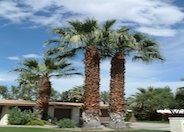
Common name:California Fan Palm, Petticoat Palm
Botanical name:Washingtonia filifera
Palm tree grows to 60' x 20' . It has light green fronds 3'-6' long. Seeds appear in fall so be sure to remove seed stalk to avoid mess on patios and sidewalks. California Fan Palm is the only palm native to California.
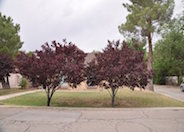
Common name:Krauter Vesuvius Flowering Plum
Botanical name:Prunus cerasifera 'Krauter Vesuvius'
30-35 feet high, equal width. Pure white flowers, tiny sweet but bland fruit. Often used a rootstock.
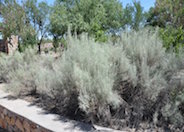
Common name:Sand Sage
Botanical name:Artemisia filifolia
Provides softness and movement in the landscape. Fragrant, threadlike leaves and stems, airy evergreen shrub is covered wiht white hairs giving it a silvery cast. Flowers inconspicuous. Fast to 3' tall and wide. Native to western plans and southwest. Grows in rocky or sandy soils 1-8000'. Full sun and well drained soils. Will tolerate sandy and clay soils.
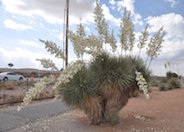
Common name:Soaptree Yucca
Botanical name:Yucca elata
Evergreen treelike yucca grows at a moderate rate to 10' x 4'. Clumps will typically have 5-20 rosettes of pale green leaves. Leaves have sharp tips. White clusters of flowers appear on tall stalks in the late spring. Accepts full sun. Leave dead leaves on trunk to avoid sunburn damage. Very frost tolerant. Native to the southwest U.S. and Mexico.
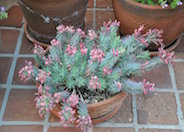
Common name:Donkey Tail Euphorbia
Botanical name:Euphorbia myrsinites
This hardy perennial grows 4-6" and has blue glaucous leaves that are stiff and round, set closely to the stem. Flattish clusters of chartreuse to yellow flowers bloom between late winter and early spring.
| Designer: Sarah Wood | The Beloved Garden 10 |
Photographer: GardenSoft |
Soils and Compost:
Practice grass-cycling by leaving short grass clippings on lawns after mowing, so that nutrients and organic matter are returned to the soil.
Water Saving Tip:
Water-wise plants can be beautiful as well as practical.
Ask at your local nursery for the types of plants that have minimal watering needs.
Integrated Pest Management:
Attract, or buy beneficial insects such as ladybugs and lacewings to control pest outbreaks in your garden.
